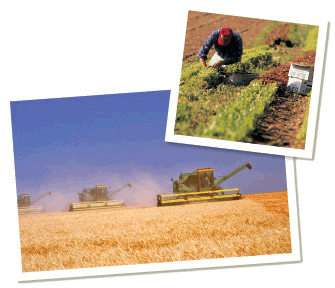Future of Farming recommendations
by Trudy Bialic, Editor
This article was originally published in August 2008

(August 2008) — It’s been more than 20 years since Washington state’s policy-makers drafted a strategic plan for agriculture. Now, they’ve started the process to develop a strategy for the next 20 years.
Based on a legislative directive, the Future of Farming project aims to figure out what state leaders can do to help Washington’s farm families be competitive and profitable over the next two decades.
Farmers, ranchers and others in the food industry already have been invited to participate in surveys and “listening sessions” where decision-makers heard what’s needed — and what future farmers will need — to keep farming.
You’d recognize several farmers who have participated so far. They include Andrew Stout of Full Circle Farm and Joel Huesby of Thundering Hooves, two partners with the PCC Farmland Trust. They’ve advocated increased support for small farms and direct marketing, and increased funding for organic and sustainable agriculture research and outreach at Washington State University.
The Washington Sustainable Food and Farming Network also has weighed in with recommendations to:
- increase institutional purchasing of Washington grown food;
- improve the processing infrastructure;
- establish a planning entity for food and farming;
- create a school curriculum on food production;
- make access to farmland more affordable, (especially for new farmers);
support practices that sequester carbon gases; and - pass a “polluter pays” liability law protecting farmers from contamination by genetically modified seeds.
As an active member of the Network, PCC collaborated with Network partners to include:
- recommendations to establish a health insurance pool for farmers and their families;
- adopt a binding arbitration measure to cover agricultural workers not covered by the National Labor Relations Act;
- better represent public health, child welfare, and nutritional interests on pesticide-related state boards, such as the Pesticide Advisory Board; and
- authorize the state to approve any permits for genetically modified crop trials before they’re allowed to proceed (similar to Minnesota’s laws).
The Future of Farming project’s final recommendations will be delivered by the end of the year to the state legislature. For more information visit the WSDA Future of Farming Web site, www.agr.wa.gov/fof/.
